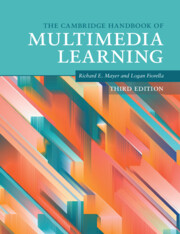Book contents
- The Cambridge Handbook of Multimedia Learning
- The Cambridge Handbook of Multimedia Learning
- Copyright page
- Contents
- Figures
- Tables
- Contributors
- Preface
- Acknowledgments
- Part I Background
- Part II Theoretical Foundations
- Part III Basic Principles of Multimedia Learning
- Part IV Principles for Reducing Extraneous Processing in Multimedia Learning
- Part V Principles for Managing Essential Processing in Multimedia Learning
- Part VI Principles Based on Social and Affective Features of Multimedia Learning
- Part VII Principles Based on Generative Activity in Multimedia Learning
- 28 The Generative Activity Principle in Multimedia Learning
- 29 The Mapping Principle in Multimedia Learning
- 30 The Drawing Principle in Multimedia Learning
- 31 The Imagination Principle in Multimedia Learning
- 32 The Self-Explanation Principle in Multimedia Learning
- 33 The Guided Inquiry Principle in Multimedia Learning
- 34 The Feedback Principle in Multimedia Learning
- 35 The Learner Control Principle in Multimedia Learning
- 36 The Cognitive Load Self-Management Principle in Multimedia Learning
- Part VIII Multimedia Learning with Media
- Author Index
- Subject Index
- References
33 - The Guided Inquiry Principle in Multimedia Learning
from Part VII - Principles Based on Generative Activity in Multimedia Learning
Published online by Cambridge University Press: 19 November 2021
- The Cambridge Handbook of Multimedia Learning
- The Cambridge Handbook of Multimedia Learning
- Copyright page
- Contents
- Figures
- Tables
- Contributors
- Preface
- Acknowledgments
- Part I Background
- Part II Theoretical Foundations
- Part III Basic Principles of Multimedia Learning
- Part IV Principles for Reducing Extraneous Processing in Multimedia Learning
- Part V Principles for Managing Essential Processing in Multimedia Learning
- Part VI Principles Based on Social and Affective Features of Multimedia Learning
- Part VII Principles Based on Generative Activity in Multimedia Learning
- 28 The Generative Activity Principle in Multimedia Learning
- 29 The Mapping Principle in Multimedia Learning
- 30 The Drawing Principle in Multimedia Learning
- 31 The Imagination Principle in Multimedia Learning
- 32 The Self-Explanation Principle in Multimedia Learning
- 33 The Guided Inquiry Principle in Multimedia Learning
- 34 The Feedback Principle in Multimedia Learning
- 35 The Learner Control Principle in Multimedia Learning
- 36 The Cognitive Load Self-Management Principle in Multimedia Learning
- Part VIII Multimedia Learning with Media
- Author Index
- Subject Index
- References
Summary
Inquiry learning puts students in an active and engaged learning mode. In inquiry learning, students try to find answers to research questions by performing investigations (in the case of science learning the investigations most often involve experiments). To be successful in inquiry learning, students need adequate initial knowledge of the domain involved and they need to be supported in their inquiry processes. Experimental work and data from PISA have indicated that guided inquiry can be an effective teaching strategy. This chapter presents an overview of the types of guidance typically found in online inquiry learning environments. Specifically, this chapter suggests the need for effective combinations of online and offline activities, such as combinations of hands-on and virtual laboratory experiences, and the use of teacher dashboards that inform teachers about the status of their students’ inquiry process, so that appropriate guidance can be provided.
- Type
- Chapter
- Information
- The Cambridge Handbook of Multimedia Learning , pp. 394 - 402Publisher: Cambridge University PressPrint publication year: 2021
References
- 3
- Cited by

